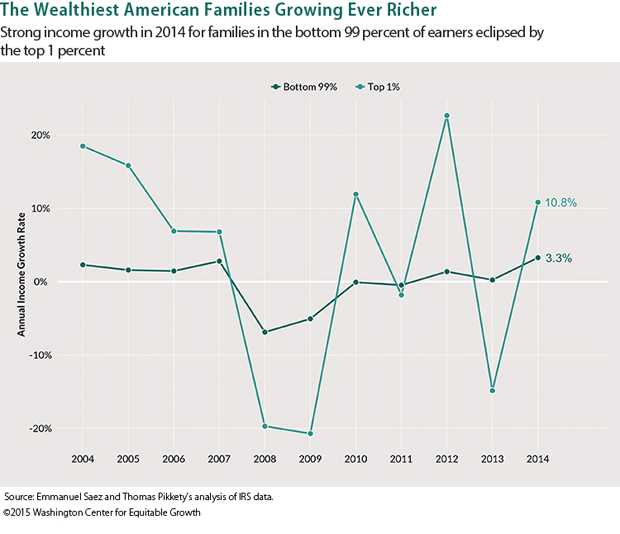The 99% did better last year; the 1% did great
Although the Great Recession officially ended in 2009, by some measures the economic recovery didn't start for most Americans until last year.
An analysis of data from the Internal Revenue Service found that incomes for the bottom 99 percent of families on the economic ladder rose 3.3 percent in 2014 from the prior year's levels, marking the best annual growth rate since 1999 (see chart below). In wake of the housing crash, people saw their income plunge nearly 12 percent between 2007 and 2009, and those earnings largely stagnated during the fitful recovery over the next five years.
Evidence that income started to rebound in earnest last year, even as wages barely stayed ahead of inflation, is another sign the U.S. is slowly but surely turning the corner. Consumer spending accounts for roughly 70 percent of economic activity, and forecasters expect rising income to boost growth in the second half of the year. Median household income in April was $54,578, up 3 percent from the year-ago period, according to Sentier Research.
If most people saw a modest, but significant, hike in their income last year, America's richest households enjoyed a downturn-defying leap. Incomes for those in the top 1 percent of earnings -- those with annual income of at least $1.3 million -- shot up 10.8 percent in 2014, according to the research released by the Washington Center for Equitable Growth.
The data underline how the gap between the nation's haves and have-nots, widening for decades, continued to stretch during the recovery, when the rich harvested the lion's share of economic gains. The top 1 percent of families captured 58 percent of total real income growth from 2009 to 2014, with the bottom 99 percent of families reaping only 42 percent.
Another reality check: While most people started doing better last year, as of 2014 the average household had recouped less than 40 percent of the income that vaporized during the recession.
Policy makers across the political spectrum have expressed concern about rising inequality of wealth and income. But while a range of remedies have been proposed to reverse the trend, higher taxes may be inadequate, at least not the moderately stiffer rates that took effect two years ago.
"The higher tax rates starting in 2013, while not negligible, will not be sufficient by themselves to curb the enormous increase in pre-tax income concentration that has taken place in the United States since the 1970s," Emmanuel Saez, a professor of economics at the University of California-Berkley and a leading researcher on inequality, said in a blog post on the Washington Center for Equitable Growth's site.
